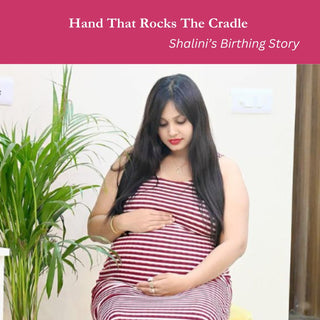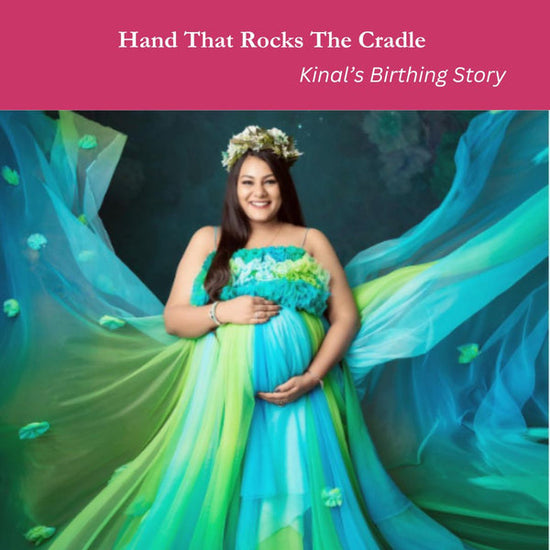*This is a podcast interview in the series - Regular Moms | Regular Birthing Stories*
*This is a Hindi Podcast Interview*
We are presenting a very special episode of "Hand That Rocks the Cradle". Today we hear the story of a very strong mother Shalini Mishra who is not only an instagram influencer but also the mother to two adorable boys. Postpartum depression (PPD) is a type of mood disorder that can affect women after childbirth. It is characterized by feelings of sadness, anxiety, and exhaustion that can interfere with a new mother's ability to care for her baby and herself. This condition is more than just the "baby blues," which is a milder form of emotional distress that many new mothers experience. PPD can occur any time during the first year after childbirth and can have long-term effects on both the mother and child. Seeking support and treatment is crucial for managing postpartum depression and promoting a healthy recovery.
WATCH THE EPISODE TILL THE END.
Watch her entire birth story video interview here :
In the Birth Story, Shalini shares her experience in both her pregnancy and postpartum period stating that though she birthed boys both times, her pregnancies were very different from each other. She confesses to wanting a daughter the second time round but coming to terms that she has two healthy babies which is a great blessing!
Shalini shares in great detail and raw honesty her struggles after giving birth which was diagnosed as POSTPARTUM DEPRESSION. She talks about how she felt, her difficulty bonding with her newborn baby and many other struggles that left her wondering what is happening to her.
She also shares how she slowly took charge of her life and mental health and the steps she took to fight this condition.
She gives hope and support to the numerous mothers who suffer in silence, thinking that they might be called "bad mothers" for voicing their mental health struggles.
You can also hear it in podcast (audio only) here :
"It's okay to not be okay. Seeking help for postpartum depression is a brave and important step."
Beyond the Baby Blues: Understanding Postpartum Depression
What happens if you have postpartum depression?
As a new mother, you may have heard about postpartum depression, but what exactly is it?
- Postpartum depression is a common mental health condition that affects many new mothers after childbirth. It can range from mild to severe, and can have a significant impact on a mother's well-being, as well as her ability to care for her baby.
- Nearly 10-15% of all new pregnancies find women experiencing some form of clinical depression, anxiety, or obsessive-compulsive disorder (OCD).
- Depression after pregnancy can begin anytime within the first two months of delivering your baby. There is a general feeling of constant despair and a severe lack of confidence in taking care of their baby and in some cases, even a fear of harming their child.
- There is no single cause of post pregnancy depression; it is a combination of biochemical, environmental, psychological, and genetic factors. Some women are more likely to be affected by pregnancy depression than others.
- In addition to affecting the mother’s health, it can interfere with her ability to connect with and care for her baby, and may cause the baby to have problems with sleeping, eating, and behaviour as he or she grows.
The Dark Side of Motherhood: How does it feel to have Postpartum Depression?
Postpartum depression can manifest in a variety of ways and can vary in severity. Some common symptoms include:
- Persistent feelings of sadness, anxiety, or hopelessness
- Loss of interest in activities you once enjoyed
- Insomnia or excessive sleepiness
- Fatigue or lack of energy
- Irritability or mood swings
- Difficulty bonding with your baby
- Difficulty concentrating or making decisions
- Thoughts of self-harm or harming your baby
It's important to note that experiencing some of these symptoms does not necessarily mean you have postpartum depression. However, if you are experiencing several of these symptoms and they are affecting your ability to function, it's important to seek professional help.
There was a huge study done on the prevalence of postpartum depression in Indian mothers in 2017 where meta-analysis of data from 1285 research studies was undertaken and the result is shocking, The study concluded that the prevalence of postpartum depression in Indian mothers is a whopping 22%.
Read the entire study here:
However the awareness is still minimal where there is no mental health checkups offered to mothers after childbirth.
Another study done in south of India which screened the women who came for postpartum checkups for mental health concluded that about 45.5% of the women screened positive for postnatal depression (44.6% of all subjects within one week of delivery and 46.9% at 6-8 weeks after delivery). This underlines the need for incorporating screening for postnatal depression in the routine care of women during pregnancy and delivery.
Healing after Baby: Coping with Postpartum Depression
Postpartum Depression is a treatable condition, and seeking help is the first step towards recovery. Here are some ways to get help:
- Talk to your doctor/ gynecologist: Your doctor can assess your symptoms and recommend appropriate treatment options. This may include therapy, medication, or a combination of both.
- Reach out to a support group: Connecting with other mothers who are going through similar experiences can be helpful. There are many online and in-person support groups available.
- Prioritize self-care: It's important to take care of yourself during this time. This may include getting enough sleep, eating a healthy diet, and engaging in activities that bring you joy.
The treatment of postpartum depression is holistic where in many factors are taken into consideration:
- Biological influences (family history, complications in pregnancy)
- Interpersonal precipitants (lack of sleep, financial issues, family conflicts)
- Psychological factors (coping mechanisms, personality characteristics)
- Personal demographics (age of mother since ppd is been observed more in higher maternal age, number of children since ppd is more common in multiparous women)
- Social factors (support system, intimate relationship)
In conclusion:
Postpartum depression is a serious and common condition that can impact new mothers' lives. However, with the right treatment and support, it is possible to recover and enjoy motherhood. If you or someone you know is struggling with PPD, reach out for help.
Remember that you are not alone, and there is hope for healing.
Every mom needs a village! We have built that community for you-join us and meet your mom friends!



